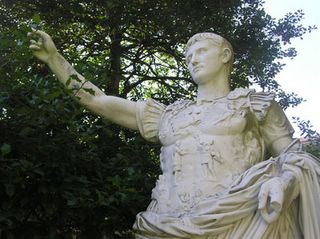aria's thoughts : emblazened sojournings
About Me

- Name: aria
- Location: Trinidad & Tobago
"The world is not what I think, but what I live through." ~ Maurice Merleau-Ponty
Friday, September 30, 2005
Wednesday, September 21, 2005
Sunday, September 18, 2005
Sunday, September 11, 2005
** Caesar Augustus

Meet Caesar Augustus
Caesar Augustus was born Gaius Octavius, son of an up-and-coming family that lived just outside Rome. His father was the first in his family to be elected to the Roman Senate. And his mother was the niece of Roman strongman Julius Caesar, who was Octavius's patron from the start.
Caesar's Heir
When Julius Caesar was assassinated in 44 BC, an 18-year-old Octavius learned that Caesar had adopted him and made him his chief heir. He assumed the name Gaius Julius Caesar Octavianus--Octavian, for short. It was a dangerous move, for it made him a potential target of those who had killed his great-uncle. It also made him the rival of Mark Antony, Caesar's old lieutenant, who thought that he would be Caesar's heir and had seized all the late dictator's assets.
Octavian's youth may have saved him. Few underestimated him for long, though. He quickly won the allegiance of many of Caesar's old troops and maneuvered the Senate into raising him to the rank of senator.
Triumvirate II
In subsequent years, Octavian proved himself a master of the double-cross. First, he joined the Senate's fight against Mark Antony. Then, he allied himself with Antony and Lepidus (another former Caesar lieutenant) to divide power between them in what became known as the Second Triumvirate (the first was Caesar, Pompey, and Crassus). Then, he eliminated Lepidus while undermining support for Antony, who was operating out of Egypt and had married its infamous queen (and former Caesar mistress), Cleopatra.
Civil war was inevitable, and in 31 BC, Octavian and his admiral, Agrippa, won a decisive naval victory over Antony and Cleopatra at the Battle of Actium. The two lovers escaped but committed suicide soon after.
Caesar II
From this point on, Octavian focused on securing his power. He established an army of 150,000 legionnaires loyal only to him. He created a personal bodyguard (the Praetorians) stationed in Rome. And he created a first-rate system of roads to maintain order and increase trade. In principle, the Senate continued to exercise its powers. But Octavian was the princeps, or first citizen, and his own power in this new "principate" was absolute--exercised through subordinates and politicians comfortably under his thumb.
Once his rule was secure, Octavian set out to revive old religious rites, encourage marriage and penalize adultery, create a civil service, institute the first Roman fire brigade and police force, and regularize taxation. As propaganda to support these measures, he emphasized his own majesty by adopting the name "Augustus," a symbolically potent term related to the terms for ritual divination (augury) and spiritual authority (auctoritas).
Death and Deification
As Augustus became Rome's first emperor, his stepsons, Tiberius and Drusus, extended the empire in the north to include Yugoslavia, Hungary, and Germany as far as the Elbe. Yet Drusus died while on campaign, and many of Augustus's other male relatives also met untimely ends, so Tiberius was left as virtually the sole candidate to succeed his stepfather. He was, consequently, adopted as son and heir in AD 4, signaling to all of Rome that the principate was hereditary.
Augustus had arranged for the Senate to proclaim his great-uncle Julius Caesar a god, and when he himself died in August AD 14, the tradition continued. He was posthumously enrolled among the gods of the Roman state. Before he died, he had seen to it that Tiberius was made so powerful that the principate would continue well beyond his death, such that no one could seriously hope that the ancient Senate would ever fully regain power. If Julius Caesar had killed the republic, Augustus saw to its burial. "Caesars"--related to Julius Caesar or not--would rule for centuries.
~ Mark Diller
August 31, 2005

* Not-So-Ancient Egypt

Egypt has one of the world's oldest civilizations, dating back more than 5,000 years. But for many of those millennia, the country has been ruled by foreigners--including Assyrians, Persians, Greeks, Romans, and Turks.
More than once, Egyptians have debated whether the latest wave of conquest was occupation or liberation. So it was when Arab armies arrived, bearing Islam, in 641. So it was when Ottoman armies arrived, bearing cannons, in 1516.
In 1798, Napoleon Bonaparte arrived, bearing ill will toward the British. As usual, France and Britain were at war, and Napoleon wanted to disrupt British commerce in the region. The French stayed in Egypt only briefly--by 1801, British and Ottoman troops had driven them out--but Napoleon's visit helped give birth to modern Egypt.
Float Like a Pharaoh, Sting Like an Asp
During the late 18th century, a series of Mamluk princes named Bey had attempted to seize Egypt from the Ottomans. Even before Napoleon arrived, they had significantly weakened Ottoman control there. When the French army left, an Ottoman officer named Muhammad Ali stepped into the power vacuum and picked up where the Beys left off.
Over the next four decades, Muhammad Ali consolidated his control and freed Egypt from Ottoman rule in all but name. He eliminated local rivals and defeated an invading British force. He drafted Egyptian peasants and turned them into a large, European-style army. He conquered much of Sudan. He also secured hereditary rule for his family, which lasted, in name at least, until 1952.
Boom, Bust, and Brits
Under Muhammad Ali and his early heirs, Egypt modernized and westernized. Agribusiness took root, with cash crops replacing subsistence farming. For a while, the economy boomed, and European moneylenders took their cash to Cairo. Western money helped pay for new irrigation systems, railroads, telegraph lines, and the Suez Canal, which connects the Mediterranean and Red seas. The Ottoman sultan even granted Muhammad Ali's son Ismail the hereditary title khedive ("lord").
Yet boom eventually led to bust, and Khedive Ismail found himself financially overextended. Desperate, the Egyptian government sold off its shares in the company that ran the Suez Canal, but Egypt still went bankrupt. After that, European influence over Egyptian affairs increased dramatically. In 1876, British and French commissioners were appointed to monitor Egypt's finances. In 1879, Ismail was forced to abdicate in favor of his son Tawfiq.
Increasing European influence led, in turn, to increasing Egyptian nationalism--and to the creation of the National Popular Party, led by Colonel Ahmad Arabi. In 1882, anti-European riots broke out in Alexandria, and the British fleet responded by bombarding the city. More riots followed, prompting Colonel Arabi to claim that Egypt was locked in "an irreconcilable war" with Britain. Khedive Tawfiq, however, sided with the British and declared Arabi a rebel. Soon British forces had invaded and occupied Egypt.
Imperialism and Not-So-Independence
Officially, Khedive Tawfiq was still in charge, but after 1883, real power rested with the British consul general. Foreign investment and public works projects resumed, but top jobs in the Egyptian government and military increasingly went to British applicants. Meanwhile, an Egyptian lawyer, Mustafa Kamil, led a resurgent nationalist movement.
During World War I, the British imposed martial law and stationed some 100,000 troops in Egypt, squashing dissent even as Egypt's poor were forced to endure new hardships. After the war, a nationalist delegation (wafd in Arabic) attended the Paris Peace Conference. The Allies ignored its calls for Egyptian independence, but "the Wafd" became the voice of Egyptian nationalism.
A few years later, Britain consented to Egypt becoming an independent constitutional monarchy--though they reserved the right to intervene in Egyptian affairs. In 1924, the Wafd won big in Egypt's first parliamentary elections.
From World War to Cairo Coup
Despite much talk of independence, British troops were still in Egypt when World War II began in 1939. Many in Egypt hoped their old imperial masters would lose, and the Wafd actually lost some credibility by supporting the Allied war effort. Meanwhile, the Muslim Brotherhood, an Islamist group, began to gain prominence, especially after British troops remained in the Suez Canal zone after 1945.
In 1948, Egypt and other Arab nations went to war to stop the nation of Israel from forming, but it didn't work. By 1949, Israel was firmly established, and many Egyptians lost faith in their government. In 1950, a Wafd-controlled parliament abrogated a 1936 treaty with the British, and Egyptian students and the Muslim Brotherhood launched a guerrilla war against troops in the canal zone. Then, in 1952, British troops killed 50 Egyptian police officers in a confrontation over a police barracks. Riots, looting, and arson rocked Cairo.
A few months later, the Free Officers, a secret Egyptian army group led by Gamal Abdel Nasser, seized power. The next year, they declared Egypt a republic and named General Muhammad Naguib president. In 1954, the Muslim Brotherhood tried to assassinate Nasser, and President Naguib was promptly arrested. Nasser assumed control and cracked down on the Muslim Brotherhood.
Nasser held power until his death in 1970. He was succeeded by his vice president, Anwar Sadat, who was assassinated by Islamists in 1981. Sadat was succeeded by his vice president, current president Hosni Mubarak. To this day, Egypt's president has near-total power.
~ Steve Sampson
September 7, 2005

Saturday, September 10, 2005
Friday, September 09, 2005
** Phrase origins: With bated breath

Meaning
Breathing that is subdued because of some emotion or difficulty that is being experienced.
Origin
Which is it - bated or baited? We have baited hooks and baited traps, but bated - what's that? Bated doesn't even seem to be a real word, where else do you hear it? Having said that 'baited breath' makes little sense either. How can breath be baited? With worms?
There seems little guidance in contemporary texts. Search in Google and you'll find about the same number of hits for 'baited breath' as 'bated breath' - around 100,000 each.
In one of the best selling books of all time - Harry Potter and the Prisoner of Azkaban, (whose publisher could surely afford the services of a proof-reader), we have:
"The whole common room listened with baited breath."
As so often, help is found in the writings of the bard. The earliest citation of the phrase is from Shakespeare's Merchant of Venice, 1596:
"With bated breath, and whispring humblenesse."
Bated is just a shortened form of abated (meaning - to bring down, lower or depress). So, 'abated breath' makes sense and that's where the phrase comes from.











































